HostGator is one of the most popular brands in the shared hosting industry. There won't be anyone who has not heard about HostGator, and its sister brand Bluehost. The latter is a recommended web host by WordPress also.
Hostgator was founded by Brent Oxley back in 2002 and the company is based in Texas, USA. But that's mostly an old story. If you have a habit of following hosting news and articles, you might have already heard about Endurance International Group (EIG).
In 2012, EIG acquired HostGator, after acquiring Bluehost one year before that. I have read various reviews online, including on TrustPilot, warning people about serious performance deterioration after EIG acquires a company.
But to be honest, I can't say whether the acquisition affected HostGator's performance or not. Because I personally don't have any experience with how HostGator performed before 2012.
The only prior experience I have with HostGator is in 2013-2014 when I bought a plan from Hostgator's Indian site for my first blog. It was okay, but lately, I began facing some speed inconsistencies. So I started hoping between hosts until finally switching to Cloudways.
So, keeping the prejudices away, I decided to try HostGator once again. This time, I purchased the lowest shared hosting plan (Hatchling) from HostGator US and tested it thoroughly. And you can read the results below.
Plans & Pricing
Looking at the main navigation, it's clear that HostGator's main focus is on selling Shared Hosting plans, although they offer VPS and dedicated plans as well.
Like most of its competitors, HostGator also offer three plans:
- Hatchling
- Baby
- Business
prices as of Oct 2020
The Hatchling plan allows hosting only one domain while with the other two plans, you can host unlimited websites. And with the highest Business plan, you can also get a dedicated IP address. But with most browsers supporting SNI SSL certificates, it doesn't matter much these days.
Coming to the pricing, HostGator also does similar tricks to attract new customers. The introductory pricing for the lowest plan is just $2.75/mo if you are willing to lock in for a 36-month billing cycle. Whereas the regular price with an annual billing cycle is $8.95/mo.
But one thing I like is, HostGator allows selecting monthly billing cycles. That's useful if you are testing the host for the first time. The price for a single month is $10.95.
Also, all three plans include free domain registration and SSL certificates.
How to Use & Features
Data Center Locations
On hostgator(dot)com, there is no option to choose your preferred data center location while signing up. As far as I know, most of their infrastructures are in Utah and Texas states in the USA.
But that doesn't mean their operations are limited there. Hostgator offers regional sites in many countries including India, Brazil, China, and many more.
For example, in the Indian site - hostgator(dot)in - you can select between the USA or India as your server location. And if you choose India, your website data will be stored inside India, according to the site. They have tie-ups with service providers like GPX Global Networks, which provide the necessary infrastructure in India.
Signing Up
Clicking on the Buy button below your chosen plan takes you to the sign-up page. The plan I selected is Hatchling, and that's what we're reviewing today.
There is nothing much distracting on the registration page, except a few upsells at the bottom of the page. At the top, you have two choices:
- Register a new domain, or
- Continue with a domain you already own
Here, note that to get the free domain offer, you need to purchase hosting for at least a year. Otherwise, if you select the one-month, three months, or six months billing cycles, the domain name costs extra. And when I checked, the price for a .com domain was almost $12.95.
I usually prefer to keep my domains and hosting separately. Also, the domain prices are much lower with Namecheap, my go-to domain registrar.
- See also: 9 Best Domain Registrars
Again, keep in mind that the introductory price shown on the front page ($2.75/mo) is only applicable when you lock in for 36 months. Whereas if you select the one-month billing cycle, the price increases to $10.95.
At the bottom of the registration page, there are a few upsells including CodeGuard backup and SiteLock security. These two options are checked by default. So if you don't want to pay extra for these add-ons, be sure to uncheck them.
Regarding the payments, HostGator supports two payment methods:
- Credit Card
- PayPal
And I could complete the payment smoothly using PayPal. So, there are no issues here. Also, HostGator gives a 45-day money-back guarantee.
HostGator Dashboard Experience
HostGator's dashboard, or Customer Portal, has a clean and minimal design. So you won't find any trouble navigating it.
To manage your hosting account, use the link on the left side to open the Hosting page. There you can see all the hosting packages you currently have.
From there, you can take two routes:
- open the settings page (manage), or
- open the cPanel
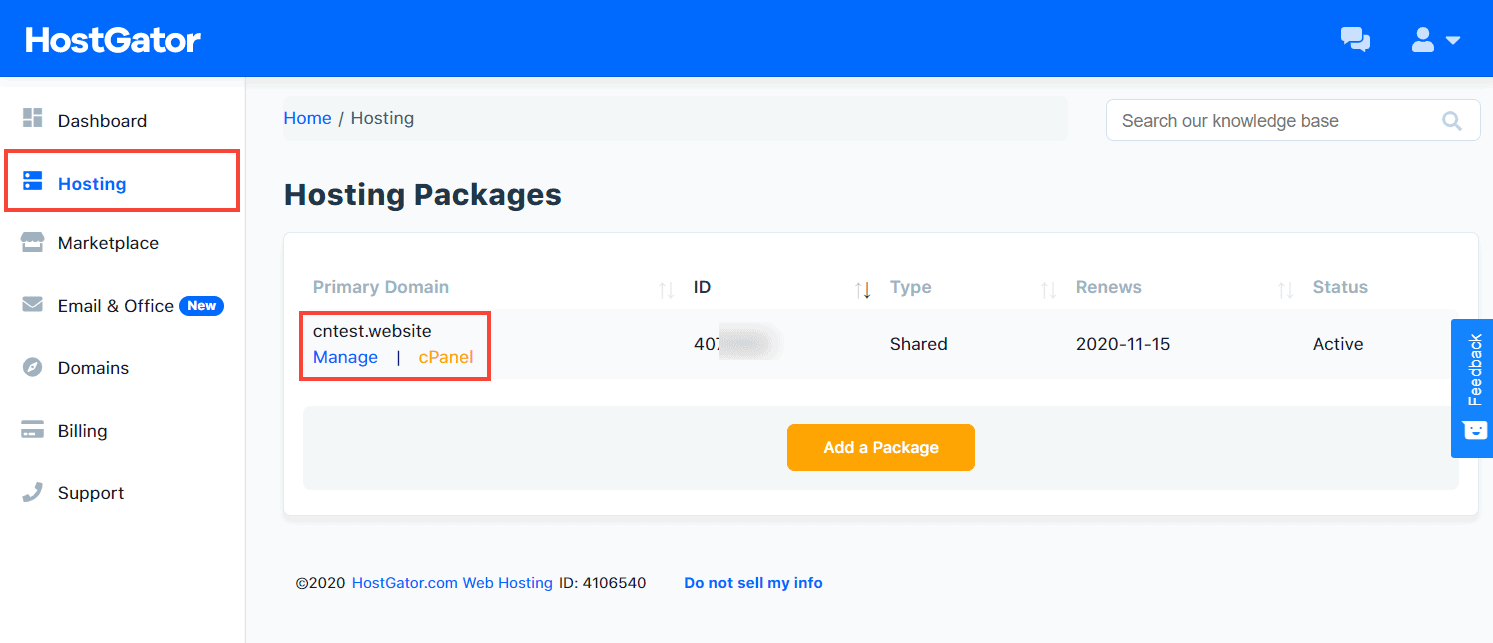
The Hosting Overview page contains nothing except the basic details and a few links to the important pages, such as cPanel, Webmail, File Manager, etc.
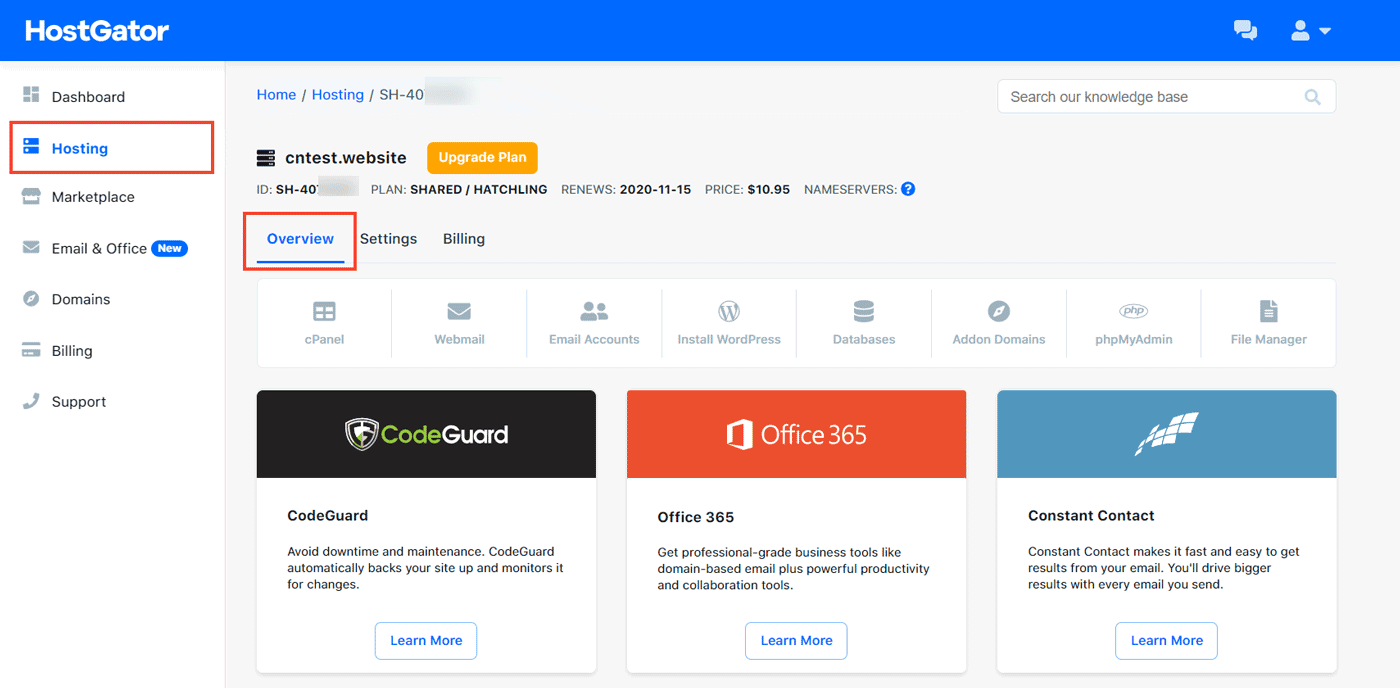
Under Hosting > Settings, you can find the important details regarding your account:
- Server name
- IP Address
- Nameservers
You can also change the account's primary domain and password from this page. Another option here is the Shell access. If you want to access via SSH, then enable that option.
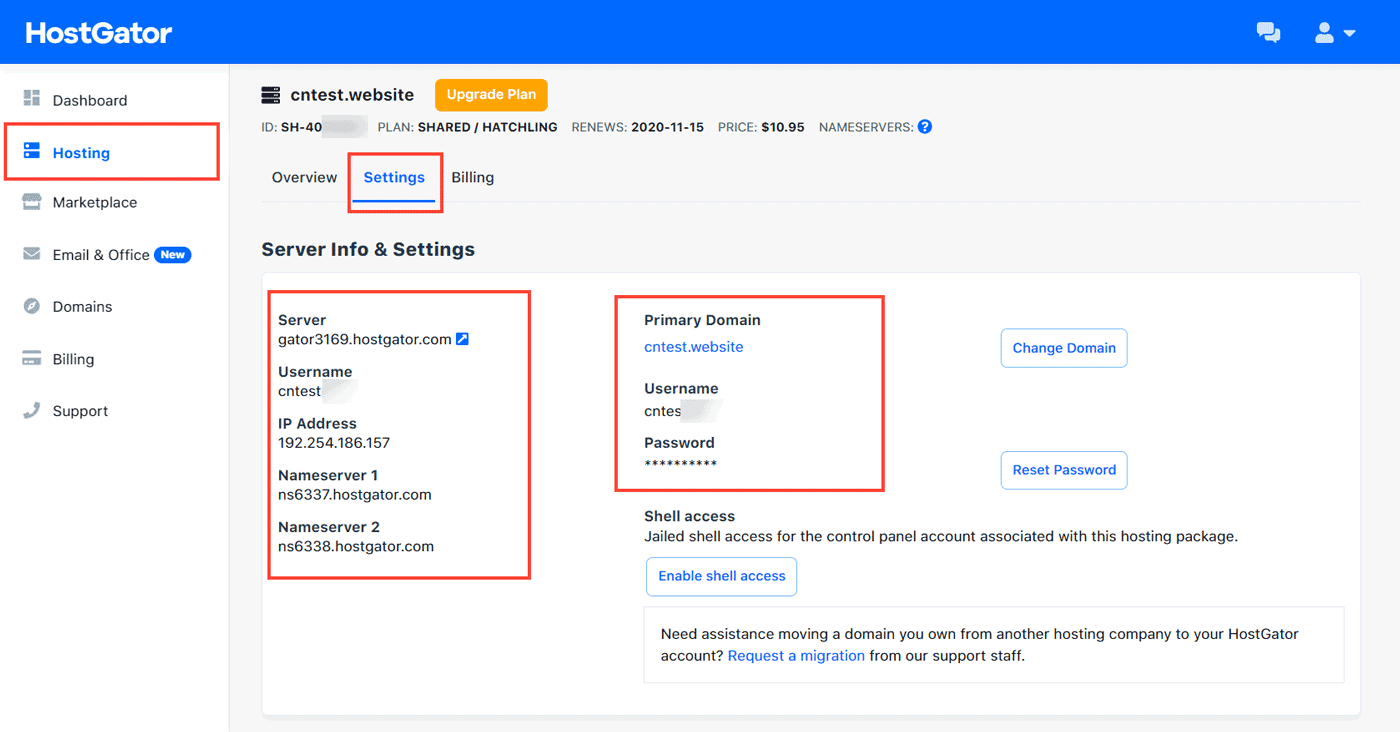
To access the cPanel, where you can find most of the hosting-related settings, click on the 'cPanel' link from the Overview tab.
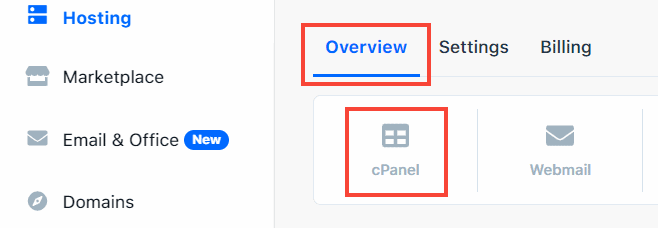
And this is how the cPanel looks:
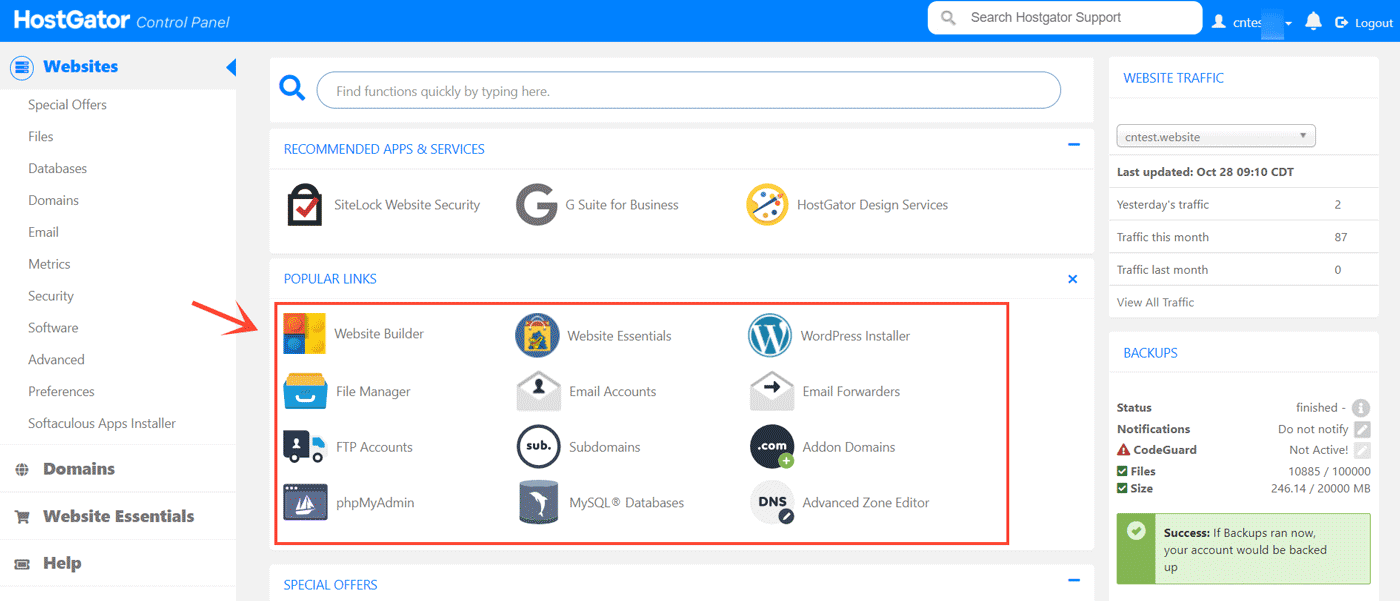
Note that HostGator is a cPanel hosting provider. Unlike Dreamhost or Hostinger who use custom control panels, you get the standard interface here. So, if you had used another cPanel hosting provider, you will feel familiar here also.
Installing WordPress
HostGator offers Softaculous for one-click App installs. You can access it in two ways:
- Click on Install WordPress from your Hosting Package's Overview page, or
- click the WordPress Installer link on you cPanel

Both take you to the Softaculous page for installing WordPress.
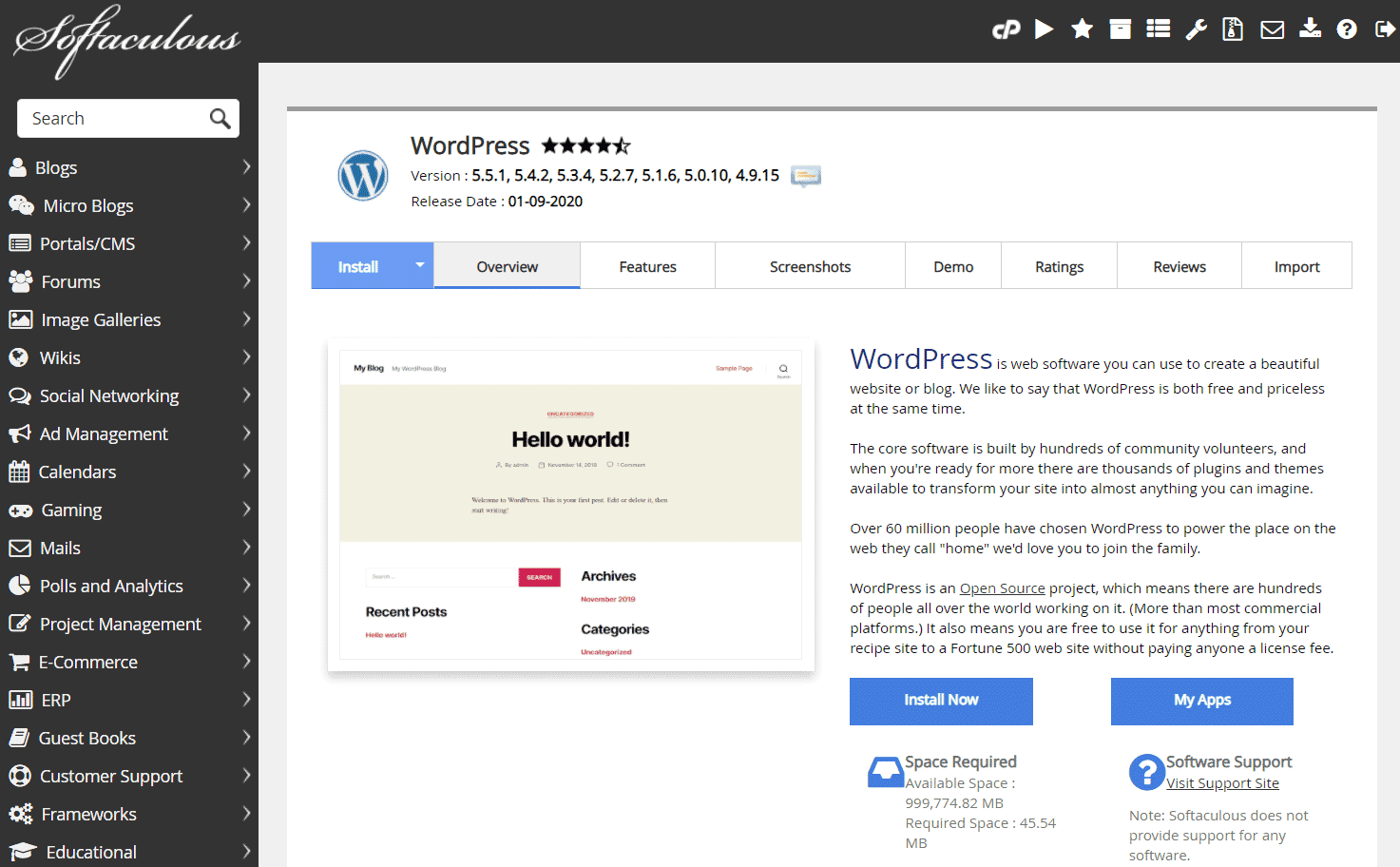
SSL Options
HostGator now offers free Let's Encrypt SSL certificates for all domains hosted with them. It's available by default on all shared hosting plans.
Instead, if you want to use a paid SSL certificate, you can purchase a Comodo Positive SSL right from the Customer Portal itself. There are options to get both Domain-Validated or Extended Validated certificates. If you have an eCommerce site, then you might want to check out the latter.
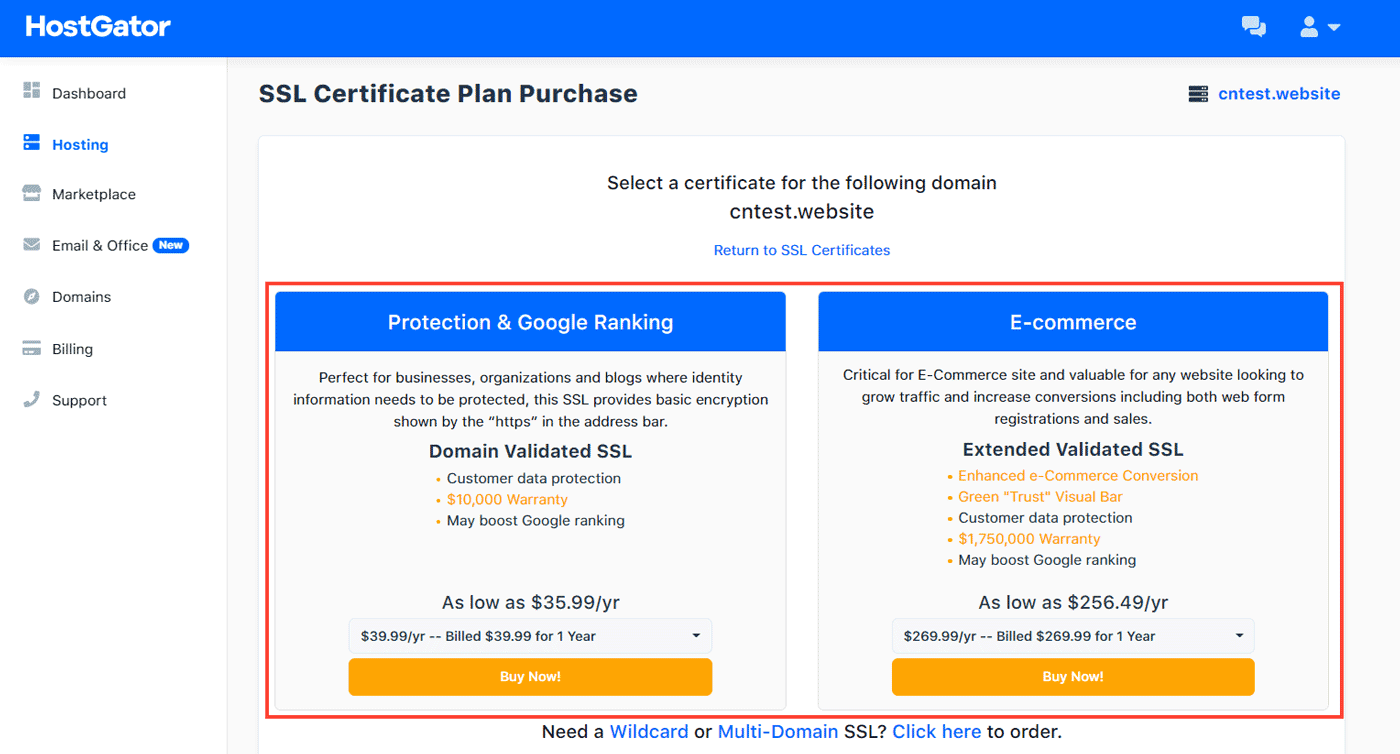
Hosting > SSL Certificates > Upgrade
Otherwise, for a typical website or blog, the Domain-Validated Let's Encrypt will be sufficient to encrypt and secure your site. It won't make a difference in SEO performance.
To check your SSL status, go to Hosting > SSL Certificates on your Customer Portal. But for some reason, when I checked mine, I saw an error saying the certificate could not be validated.

So I contacted the support and asked why it was showing a warning.
And it turned out that the validation failed because the domain (bought with Namecheap) was not initially pointed to HostGator's IP address. Although later I pointed to it correctly and re-checked it, there was no difference. And the live chat support couldn't solve it either (more on the Support below). In the meantime, I got another free certificate from ZeroSSL and installed it from cPanel.
That brings me to another point. You don't need to use a certificate provided by HostGator. You can use any third-party certificate you've got from any vendor. To install it, go to the SSL management section in your cPanel.
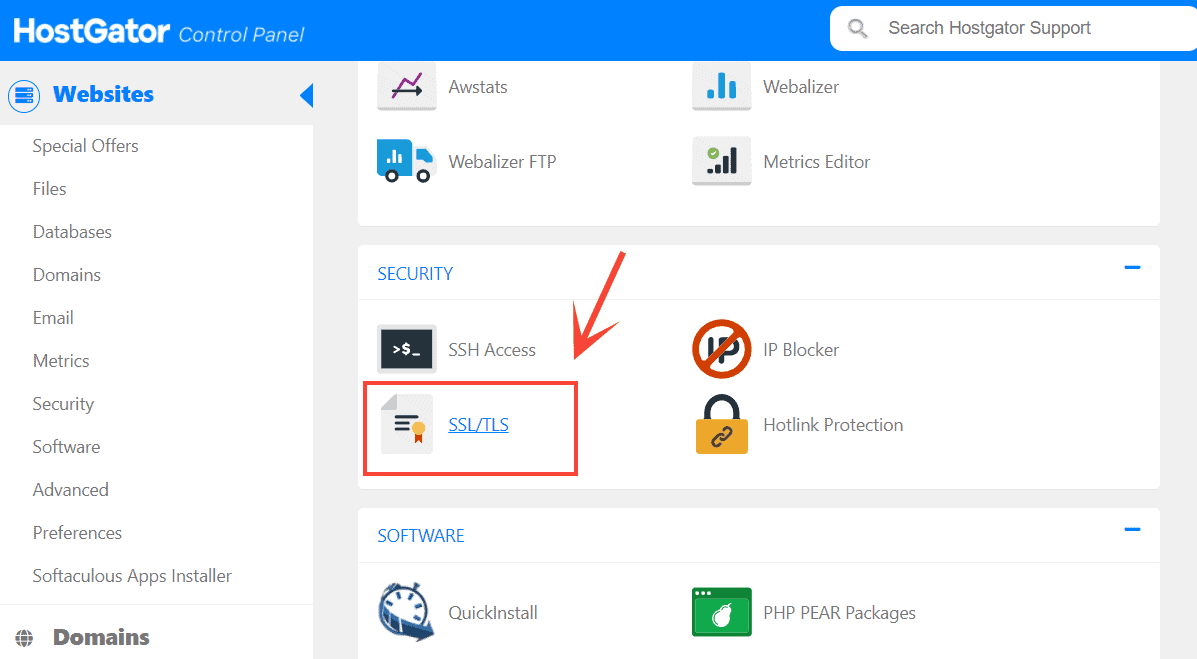
install any SSL certificate for free
And when I installed the ZeroSSL-issued certificate, the SSL Certificates page on the customer portal reflected the same.

Performance & Security Features
It may not be reasonable to expect VPS-grade performance features from a shared hosting plan. But HostGator does provide a few things.
In the security department, HostGator offers two addons for their shared hosting plans:
- SiteLock
- CodeGuard
The first one - SiteLock - helps to keep your sites free from malware and other threats. It comes at an extra price starting at $1.99/mo.
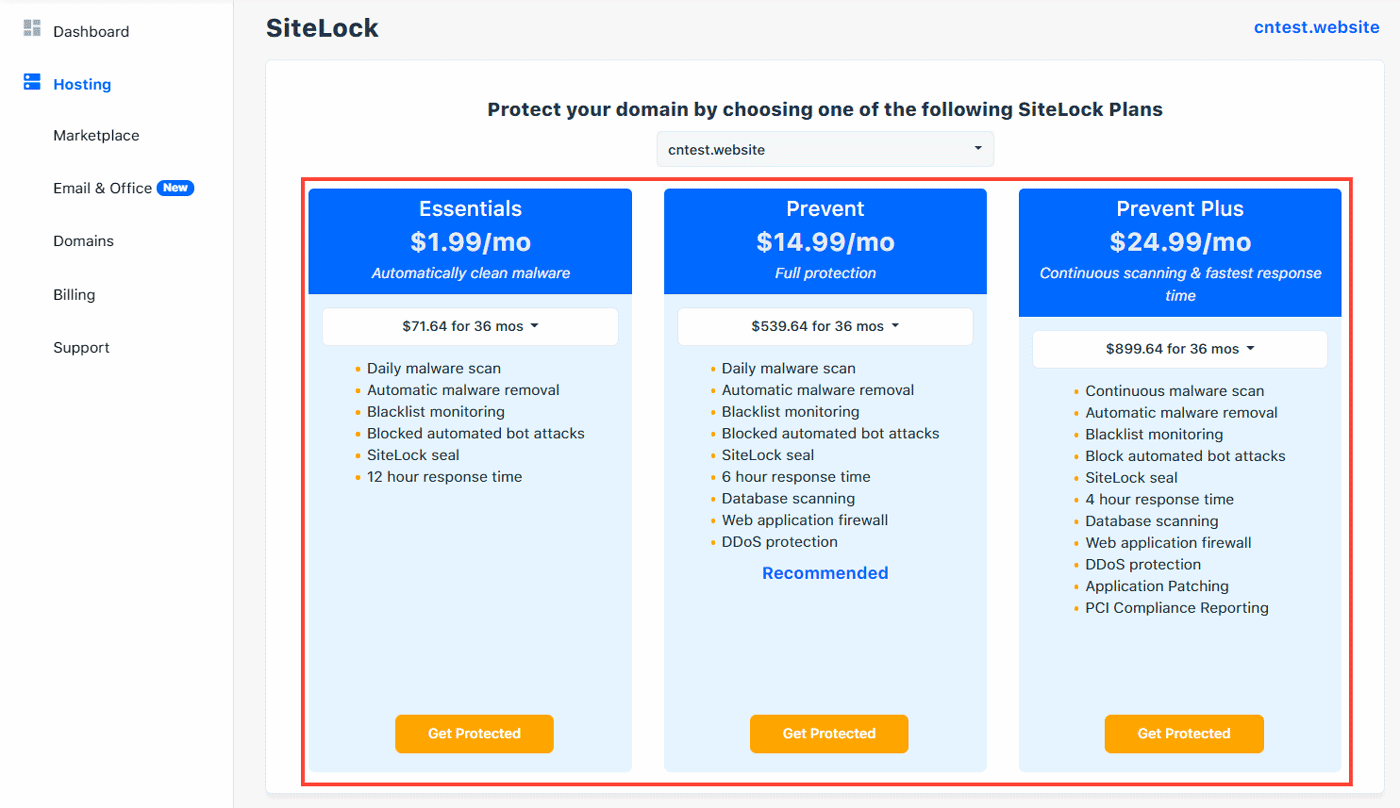
So, is it worth it? In my opinion, there are several security plugins for WordPress out there. And if you need critical security, using a paid website firewall like Sucuri may be better.
Backups:
HostGator offers standard cPanel-based backups, that store the files on the same server. In addition to that, CodeGuard is offered as a premium backup solution that allows storing the files on the cloud.
But again, there are several free and premium backup plugins for WordPress that allow backing up to any cloud provider of your choice.
So, usually, I don't opt for these services.
Next is performance. By default, WordPress sites on HostGator come pre-installed with a caching plugin called Endurance Page Cache. However, I could not find much information about the plugin in their support articles.

the plugin appears under the must-use category on the WordPress admin Plugins page
So, I contacted the live chat support. From that conversation, I realized that HostGator has a built-in server-level caching mechanism, and this plugin integrates it with WordPress.
However, I wanted to disable it and use W3 Total Cache instead. After testing both the plugins using GTmetrix, I could find that W3 Total Cache can give better speed than Endurance Page Cache.
Here, note that the Endurance Page Cache is a must-use plugin. So, you should look for it under Plugins > Must-Use.
Performance
I tested the performance of HostGator with a sample WordPress site built with Elementor. The site also had Yoast and WPForms active. To make it resemble a real-world website, I added some dummy text and images also.
- Plugins used: Elementor, Yoast, WPForms
- Active Theme: Astra
- Caching plugin: W3 Total Cache, Caching method: _Disk: Enhance_d
- WordPress 5.5.1
With these configurations, I conducted the following tests:
- GTmetrix - ran 3 tests and took the average
- Pingdom Tools - ran 3 tests and took the average
- Stress test using Loader.io
- PHP & MySQL performance test using WPPerformancetester plugin
- WP Admin page generation time using WP Query Monitor Plugin
Let’s analyze the test results one-by-one:
GTMetrix Tests
| HostGator Speed Test - GTmetrix | ||
|---|---|---|
| Location | TTFB | Onload Time |
| Dallas | 219ms | 1630ms |
| Hong Kong | 519ms | 1910ms |
| London | 555ms | 1863ms |
| Mumbai | 831ms | 2783ms |
| Sydney | 762ms | 3167ms |
| Sao Paulo | 600ms | 2453ms |
| Vancouver | 213ms | 1977ms |
| Average | 539ms | 2255ms |
Pingdom Tests
| HostGator Speed Test - Pingdom Tools | ||
|---|---|---|
| Location | TTFB | Load Time |
| Tokyo | 729ms | 1760ms |
| Frankfurt | 830ms | 2017ms |
| London | 730ms | 1860ms |
| Washington DC | 297ms | 815ms |
| San Francisco | 216ms | 821ms |
| Sydney | 891ms | 1923ms |
| Sao Paulo | 975ms | 2373ms |
| Average | 667ms | 1653ms |
LoaderIO Tests
To find out how well HostGator could handle simultaneous visitors, I tested the sample website using LoaderIO by steadily increasing the no. of users from zero to a thousand within one minute.
And HostGator handled the load really well. Not only was the test completed successfully, but the no. of errors was also quite lower.
Timeout errors started occurring only at 47s when the no. of users crossed 750. The average response time was 715ms.
| No. of users | 0 - 1000 |
| Total Time | 60s |
| Avg. response time | 735ms |
| Success rate | 99.9% |
| Timeout started at | 47s |
| Test completed | Yes |
Overall, HostGator performed well in this test, much better than what I expected from a cheap shared hosting plan.
PHP & MySQL Benchmarking
The above tests only measure the loading speeds. It won't let you know how powerful the server is. And to know that, I did a simple benchmarking using the WPPerformancetester plugin.
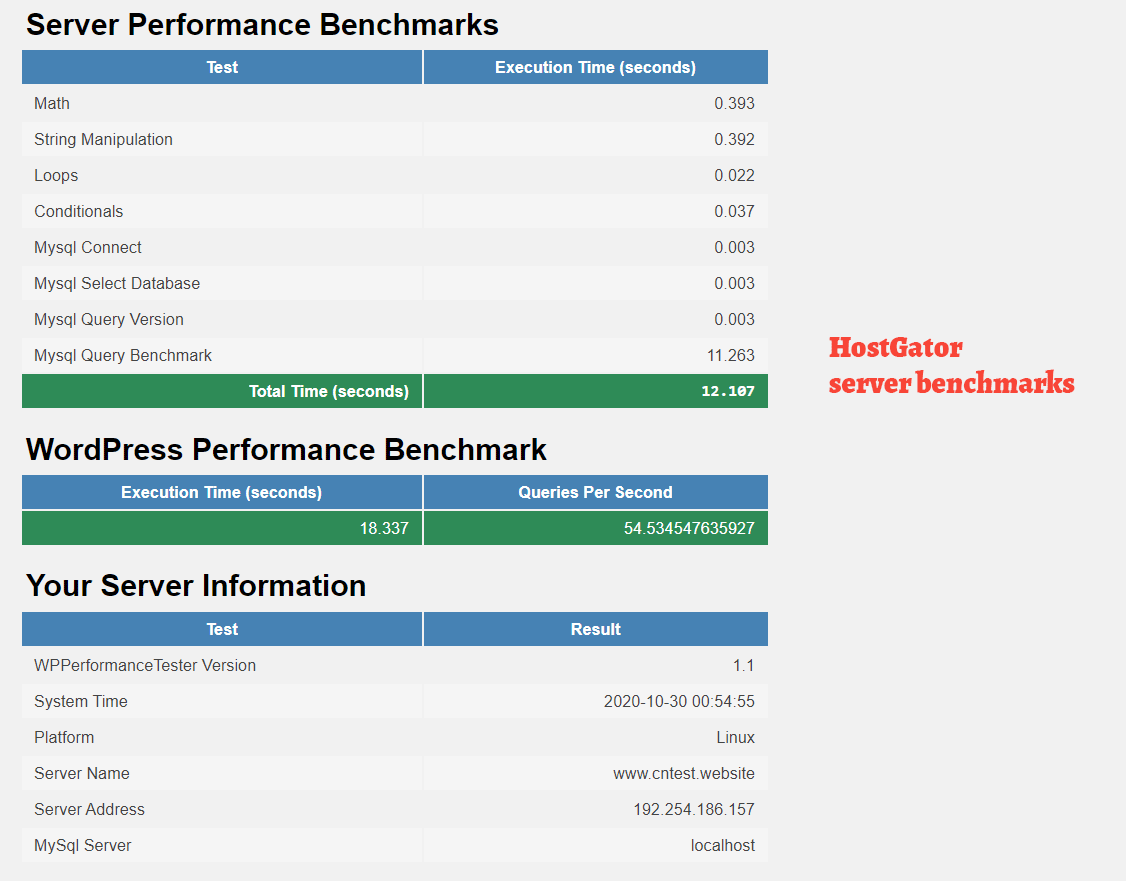
Below is the average of three tests:
| Server Benchmarks | |
| Execution Time | 11.22s |
| WordPress Performance | |
| Execution Time | 15.61s |
| Queries per second | 67.31 |
The numbers are not that great, which means the servers might be underpowered. For a comparison, look at Dreamhost's results.
Here one thing that interests me is, the loading test results are great while the benchmark results are not. While for Dreamhost, it was the opposite. That means HostGator may have a great network that is able to handle the load. But the server's hardware may not be that powerful. At least, that's my understanding. What do you think?
WP Query Monitor Results
The WP Query Monitor plugin helps measure the following things:
- how long it took for a page to be generated on the server
- time spent querying the database
| Home Page | Admin Page (Dashboard) | |
| Page Generation Time | 1227ms | 875ms |
| Database Query Time | 51ms | 57ms |
The page generation time was over 1s for the home page, which is on the slower side. Otherwise, no issues.
Support Quality
There are mainly three ways to get help from HostGator:
- Live Chat: available at all times
- Support articles: browser through a ton of help articles
- Phone support: two numbers are given, available all the time
Out of the above three options, I've tried the live chat a couple of times, and here are my experiences.
My experience with HostGator Live Chat
First, I contacted Chat support regarding the SSL validation issue I mentioned above. Someone from the staff connected within seconds. However, even after chatting for nearly half an hour, they were not able to solve the issue.
And finally, the issue was converted into a ticket. I did receive a response the next day, but for such a simple task as activating an SSL certificate, I expected a faster resolution.
Got fast replies? Yes,
Problem solved: No
The second time, I opened a chat session to enquire about the Endurance Page Cache plugin. Again a staff joined and started attending to my questions within a few seconds.
I said that I wanted to switch to W3 Total Cache, and asked whether I should disable the existing plugin or not. The answer was obvious - you should not use two caching plugins simultaneously. But to my surprise, the person replied that he wants to research that, and after a couple of minutes, he replied that I can disable it.
Got fast replies? No,Problem solved: Yes
The next query was about their server-level caching. Seeing the two headers - x-server-cache and x-cache-status - in the Chrome Network tab, I was sure that HostGator was using some server-level caching mechanism like Varnish. But the person was not able to the details of it.
Overall, I feel that HostGator's support is fast, but not efficient enough.
Uptime & Reliability
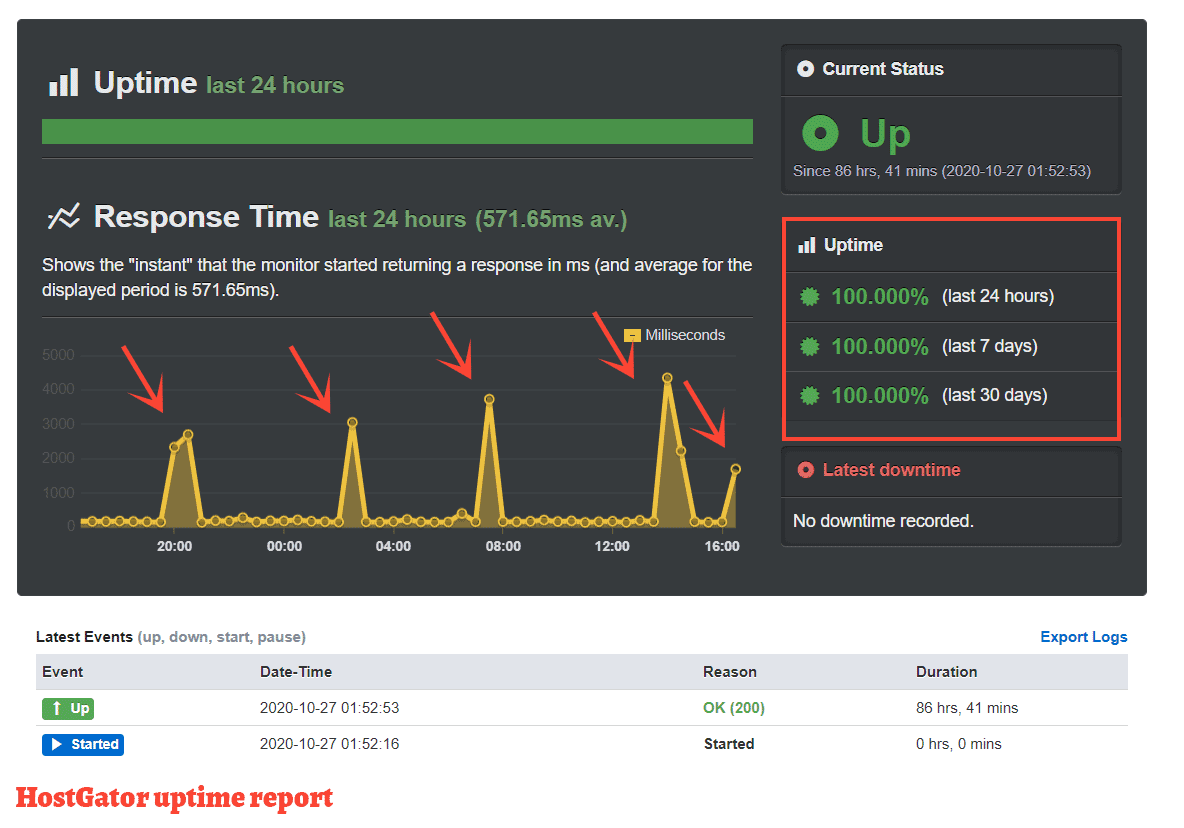
During the period I tested, HostGator stayed up for 100% of the time, according to Uptime Robot. Of course, I know that the test duration was not long enough. But it gives an idea of what you can expect from the hosting provider.
One thing that concerns me here is the inconsistent response times. Look at the graph above. It shows the response time within a 24-hour period. And there are almost 5 spikes, the highest going over 4 seconds. Although the uptime is 100%, the server often responds slowly to requests.
HostGator Review: Pros & Cons
Conclusion: Do I Recommend HostGator?
As of now, I do not recommend HostGator.
I have mentioned the reasons under the cons list above. Compared to that, in my opinion, Dreamhost is still a better choice.
However, if they improve their support efficiency, I might consider them for hosting small websites in the future. Their monthly billing and discounted long-term prices make HostGator an economical option.

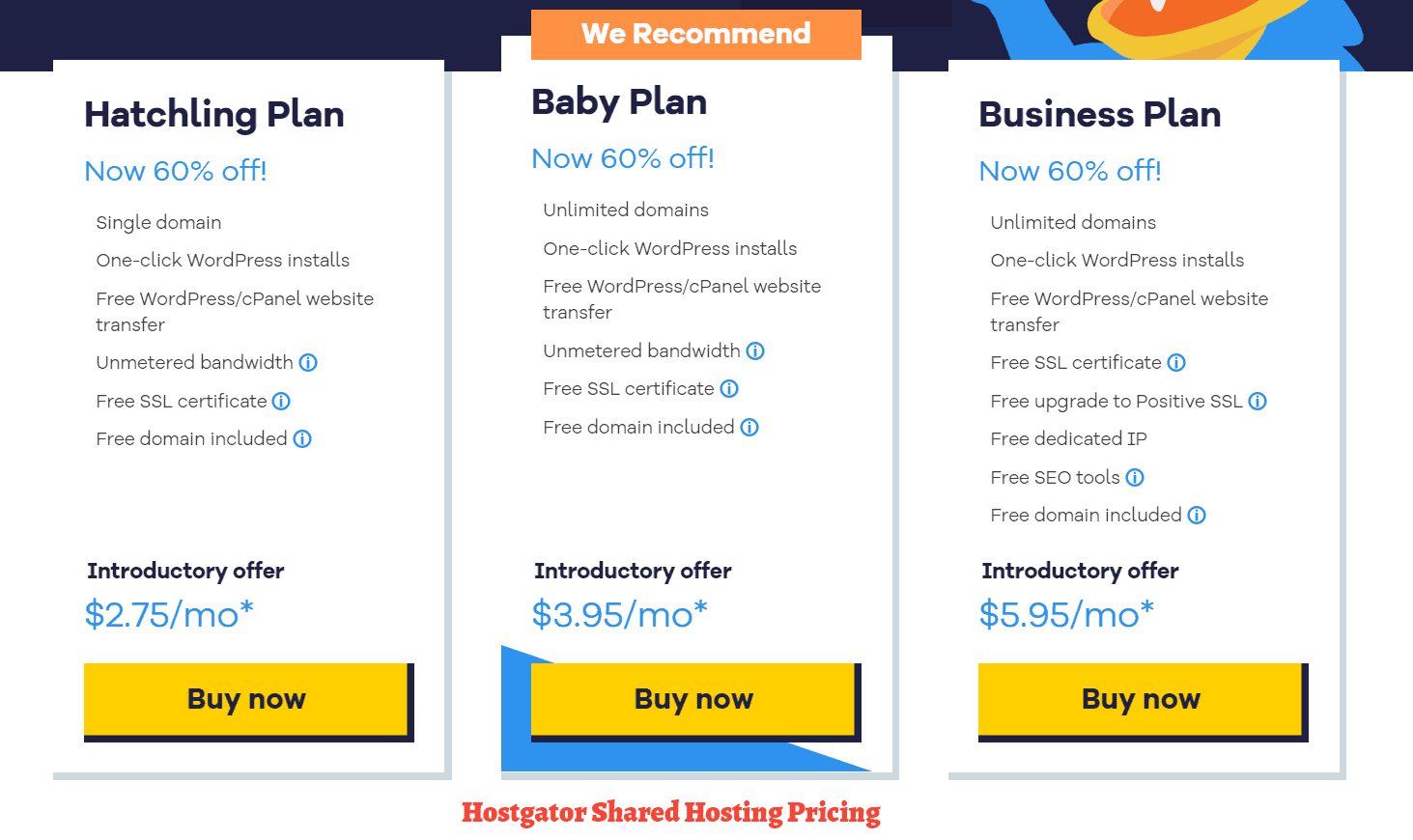
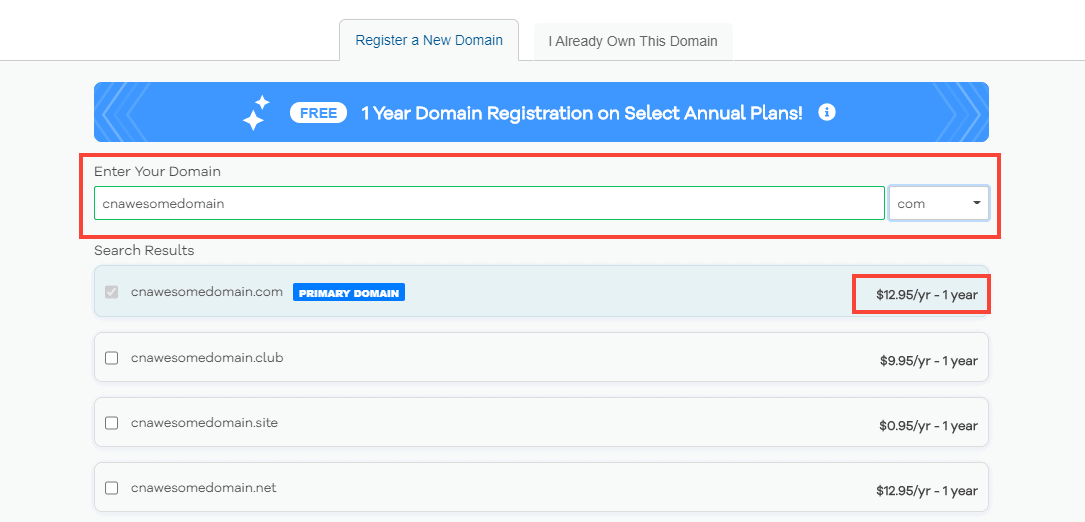
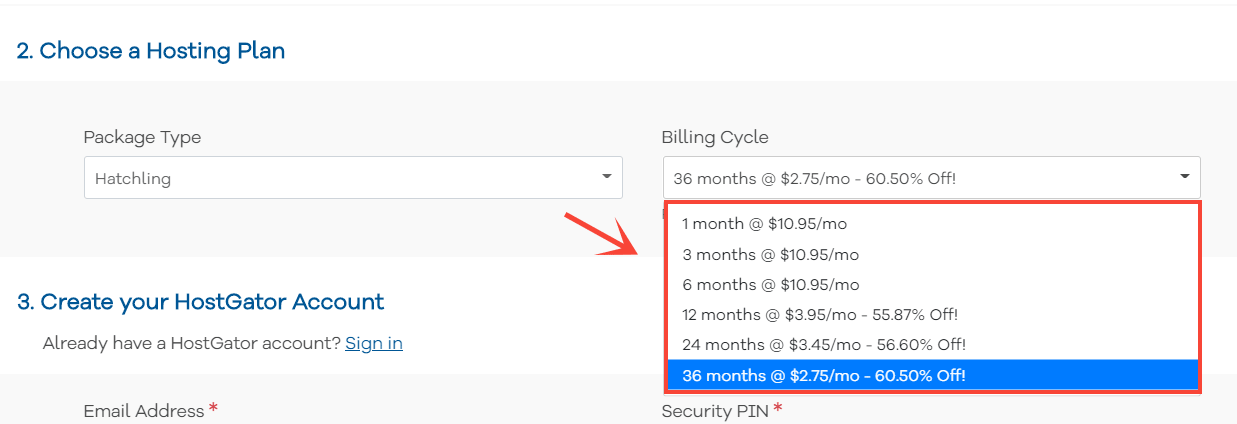
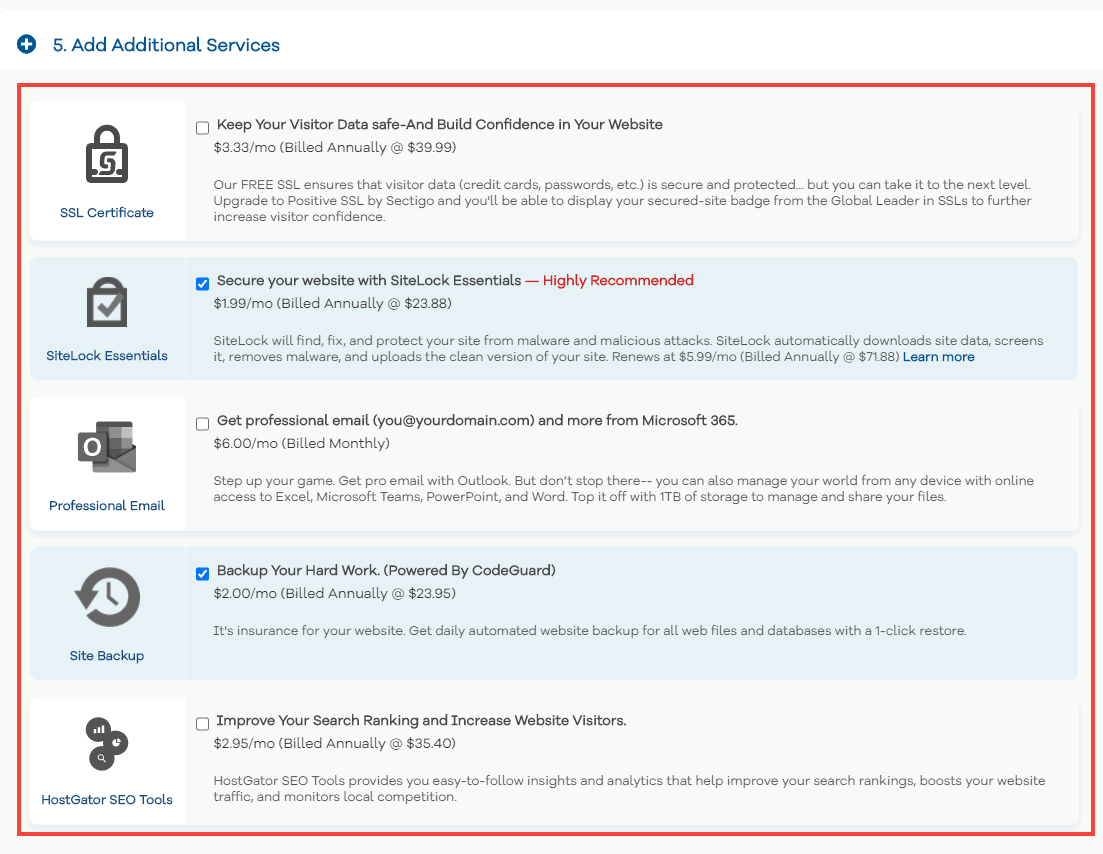
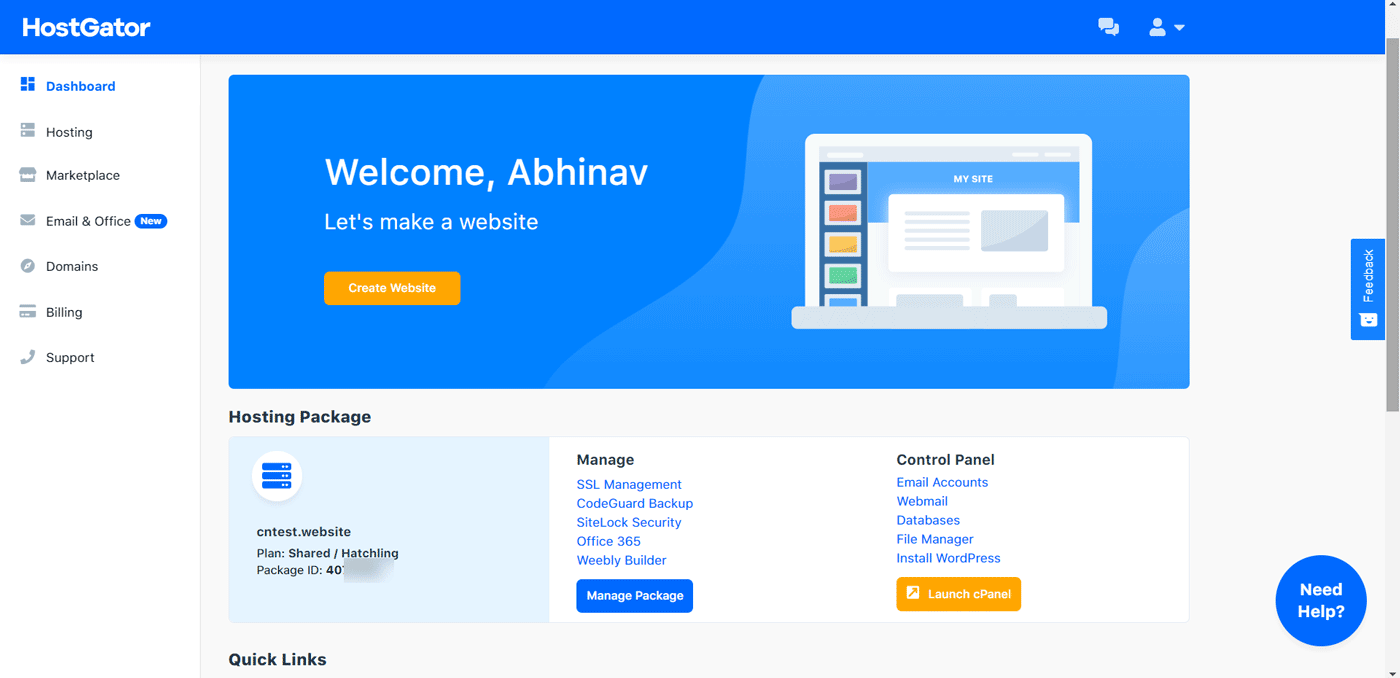
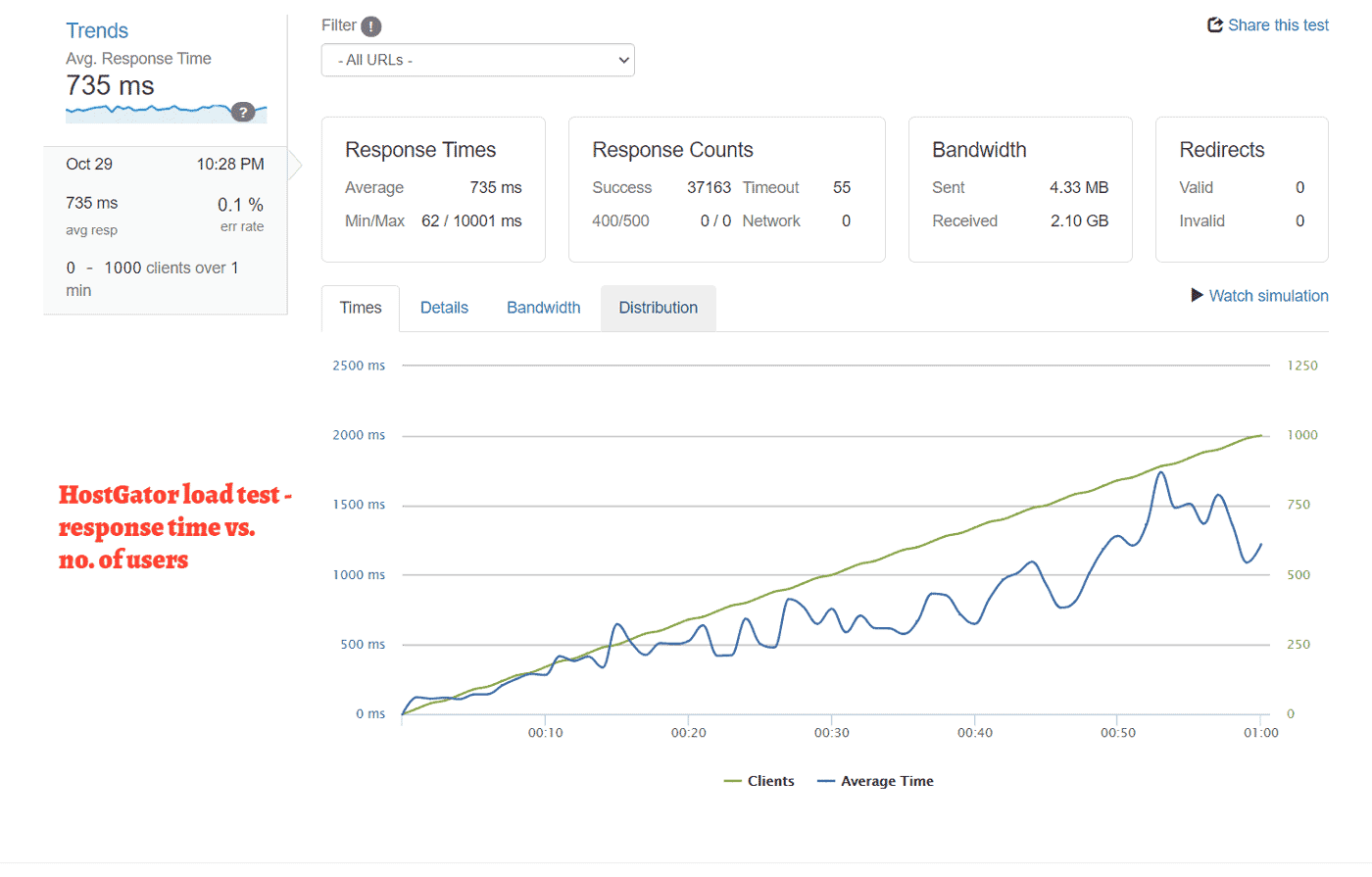
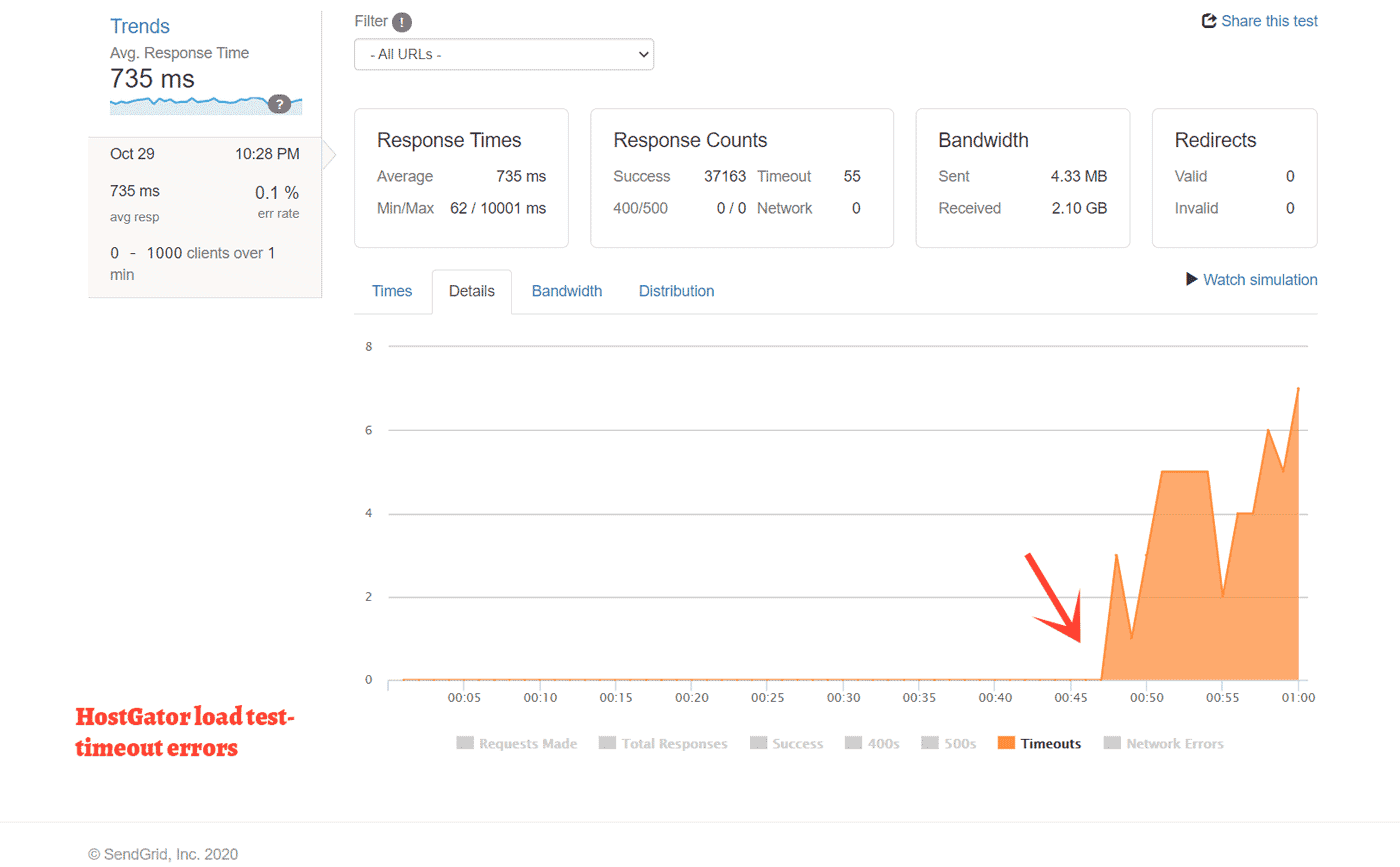

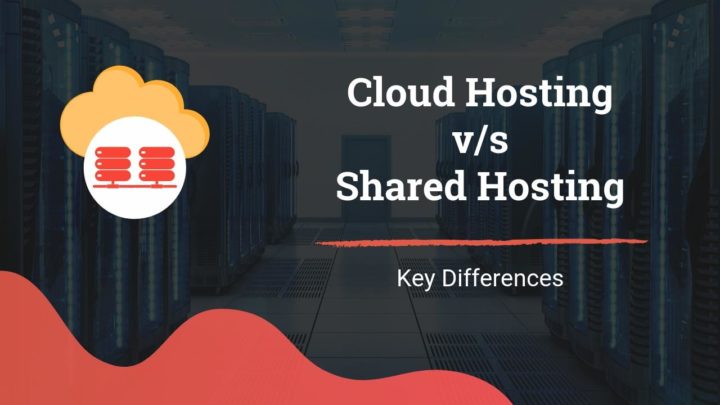
![Cloudways Review [2022] - How it Differs from Traditional Web Hosting](https://cdn-2.coralnodes.com/coralnodes/uploads/medium/2019/05/cloudways-review-featured-1.png)
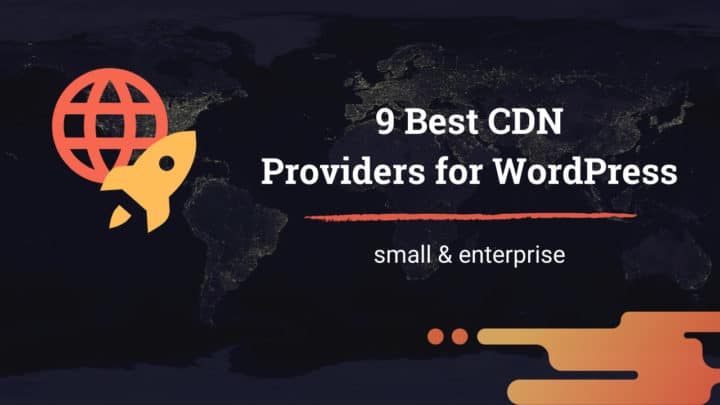
![Top 7 Cloud Hosting Providers for WordPress [2022]](https://cdn-2.coralnodes.com/coralnodes/uploads/medium/2019/07/cloud-hosting-providers-wordpress-featured-1.jpg)